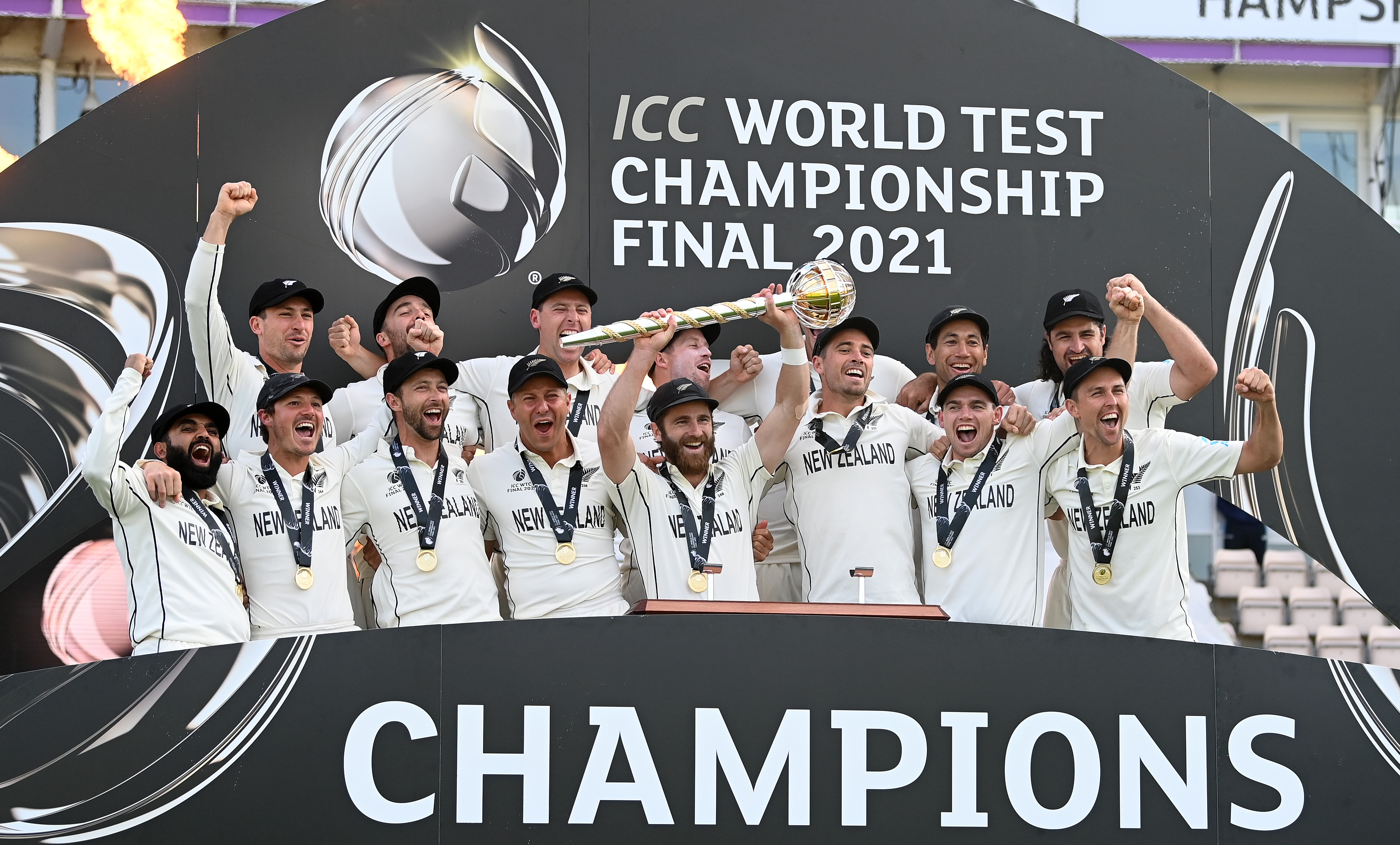Nice guys New Zealand certainly finished l̶a̶s̶t̶ first
New Zealand not only came into this final as the nice guys but also as the favourites, so would they finally put an end to the ‘nice guys finish last’ quote. But will they turn another page in the same notebook?

After Ross Taylor had made history, putting smiles on the faces of around 50 lakh people back home, who turned in the late hours to support their BlackCaps, there were several Indians dejected, including the players. Arguably one of the most fearsomely assembled sides in the Test world, India had just succumbed to the humble and nice guys.
“New Zealand have played just 14 Tests, how are they, the right winners of this competition,” asked several, in the studio, on the internet and certainly on a lot of lips on the night, as the clock seemingly went past 11 PM in the country. There was an eerie silence, figuratively and literally, on the field, as Virat Kohli stood and stared at defeat, a painful one this time around.
India were not just beaten, they were convincingly pushed aside by the no-more or never were pushovers, New Zealand. Once that sunk in, the fans immediately started their second favourite sport, after cricket, blame-game. But elsewhere, New Zealand, a side that has indeed faced more rejection in the last decade in ICC competitions, were finally smiling, their project - which saw several turnarounds in the last few years - had finally paid off, no asterisk whatsoever.

 New Zealand fans at the venue © BlackCaps
New Zealand fans at the venue © BlackCapsNo umpiring errors, no judgemental errors, no tactical errors - New Zealand and their fans had a plethora of reasons to celebrate, the least of which was the World Test Championship final. The sport, which is not certainly the most popular one in the country, certainly not the most-anticipated one either, in the calmest and humble fashion - had put them on the globe. But how did a country of that population, precisely plan their ascendancy to the throne, without spilling a secret or two to the entire world?
Kyle Jamieson is made in a lab, not literally but figuratively, in a lab where the entire growth came from the cricketing system - in New Zealand. Jamieson was not just another cricketer, another all-rounder from the country but his uniquely positioned talent combined with hard work made him hard to ignore. So the comparison to the one made in labs, he’s just different made more sense.
But this is a country that made a meticulous effort and decision to build a team, from the ethos and principles of Brendon McCullum’s Kiwi side, one that has been well revered in International cricket. In fact, that team, that system, the modus operandi did not just win a World Test Championship but also inspired a World Cup win, albeit elsewhere in the world. The BlackCaps are the perfect example of nice guys and until the boundary from Taylor confirmed it, they were still on the lines of the quote, finishing second.
*****
“This team is too nice to win anything,” spearheaded some of the smear campaigns on the various social media platforms. Too nice? That’s one of the bizarre adjectives that you could knot up with a nation that built the All Blacks. In fact, that is not even the adjective that you would find in the first instance when you watch McCullum chuckle up a few words with the opposition.
New Zealand, in fact, had a cricketing culture, one evidently producing some of the greatest ever cricketers - Richard Hadlee, Chris Harris, Nathan Astle, Martin Crowe, Stephen Fleming, Brendon McCullum, Kane Williamson, Ross Taylor - but barring the title in Nairobi, there was nothing to prove the coveted fame. Finishing second, even though on a tie, wasn’t equivalent to finishing winners. Being nice, on the same hand, wasn’t equivalent to being losers.
2 - Kane Williamson has now surpassed Stephen Fleming's record of 7,172 Test runs to become the second-highest run-getter for the @BLACKCAPS in this format, only Ross Taylor (7,517) has scored more runs than the New Zealand skipper. Milestone. #WTCFinal #INDvNZ #WTC21 pic.twitter.com/VrQhDma1VQ
— OptaJim (@OptaJim) June 22, 2021
Kane Williamson echoed New Zealand’s cricketing culture at its finest, intelligent and calm at the mind, strong and brave at the heart. Williamson wasn’t just another home-grown Kiwi player but he was one that was earmarked to take the BlackCaps to new heights. In fact, he was the living messiah, a living embodiment of New Zealand cricket.
Their most experienced player on the pitch, Ross Taylor, started it all the way from the bottom to the top, amateur into a full-blown professional now. When the nicest team took the field against the feared ones, there was bound to be a clash of ideas but both teams were playing for the win. Tim Southee, Trent Boult, Tom Latham and Henry Nicholls - New Zealand’s team was not just well-skilled but well-tempered to take on any opposition.
But the journey needed a few more heads before they marked themselves as the first World Champions of Test cricket in the purest format of the game.
*****
On June 2 2021, at the age of 29, New Zealand’s newest entrant to Test cricket, Devon Conway, left an indelible mark on his debut day in the whites. At the home of cricket, Lord’s, against one of the best home attacks, Conway got to his maiden hundred in the longest format, raised his helmet and toasted in the Lord’s honours board.

 Conway's name on the Lord's board © Lord's Cricket Ground
Conway's name on the Lord's board © Lord's Cricket GroundLike Conway, a handful of New Zealand cricketers - BJ Watling, Neil Wagner, Colin de Grandhomme and Ajaz Patel amongst others - had to make their journeys from elsewhere. Watling and Wagner had set the trend, with their journey from South Africa, de Grandhomme wasn’t far away, moving to New Zealand from Zimbabwe.
But the challenge was far more than that. How would the system accept the players and immediately make them feel at home? Enter New Zealand Cricket. Several stories of how Conway had made it into the domestic system is now a well-sung tale but the journeys were similar for Watling, having made his early days in the game in Durban. Since making his move, at the age of 10, Watling transformed himself from a specialist batsman into one of world cricket’s most under-rated wicket keepers.
De Grandhomme took a slightly de-route, having played for Zimbabwe’s U-19 side before making the move to Auckland in 2006, a place that he calls home ever since. While he made his instant mark in the shortest format, notably for his power-hitting, he slowly but steadily made his presence felt in the longest format, with runs and wickets on the domestic circuit.
And then there was Neil Wagner, now one of the tireless pieces of BlackCaps’ Test domination. “He bowls long spells,” could simply be a well-renowned definition for the left-arm pacer, who made his journey from Pretoria, South Africa. Unlike others, he took a different route, went to county cricket, polished himself, rediscovered himself and then put himself back on the map, to New Zealand. Post a four-year stand-down period, having year after year churned results for Otago, the left-arm seamer finally established himself as an immediate prospect for the BlackCaps side.
Cut to 2021, Watling, Wagner and de Grandhomme have already established themselves as true Kiwis, with Watling also announcing that the World Test Championship would be his final game in the BlackCaps whites. For Conway, it was just the start of his Test career, the pressure was paramount but the confidence and energy that he stemmed from the others made him look like he always belonged in this side.
*****
After losing two quick wickets, New Zealand, the favourites, find themselves under all kinds of pressure, with Ravichandran Ashwin causing havoc. Enter Ross Taylor! After giving away a start in the first innings, due to a loose shot away from his body, Taylor in his mind now has not just that innings but also the 2019 World Cup final loss, at the hands of England. The most experienced New Zealand batsman had experienced bitter loss once. But twice? Twice wasn’t his cup of tea.
Ashwin was taking his time, slow and sturdy to the crease, the speeds changed, it fell dramatically, he was tempting Taylor to drive and the ball, later cut and then ultimately, sweep it to the leg-side. All of it didn’t work, Taylor, who was in fact one of the pioneers of this Test side, going all the way back to 2002-03, the same year, which Jarrod Kimber mentions about the domestic players going on strike.
Luteru Taylor, in fact, is one of the two Samoans to have played cricket for New Zealand, after Murphy Su'a, who played in the mid-’90s. Not just that, according to Dylan Cleaver, the men of Wairarapa are stoic and undemonstrative. “It's a place, like so much of small-town New Zealand, where excellence is treated first with suspicion and only later with pride,” and not known as a cricketing province.
For the right-hander, to walk from that part of the country, just on the verge of making history, every run was gold and he ensured that every ball he faced made him stronger. Incidentally, he also was instrumental in the BlackCaps reaching the final in the 2019 World Cup but due to the freak nature of the rules, the Williamson-led side had to settle for the second draw. As he battled Ashwin from one delivery to another, the win percentage kept rising, from 80% and onwards. New Zealand had found themselves in this position only after Jamieson’s efforts earlier in the second innings. While Williamson ran towards the right-handed Taylor, a teardrop thudded on the ground, in New Zealand, a happy tear, one that seemingly had evaded them for a long time. No longer were they the underdogs, they were, in fact, now the top-dogs, the only team to be named the champion in cricket’s longest format.
*****
Just minutes after Taylor had the happy tear, the BlackCaps took to Twitter, posting one of the most important messages of the team. “TEAM FIRST. There are 15 players here but 22 players have represented the team during WTC21,” it read.
TEAM FIRST. There are 15 players here but 22 players have represented the team during #WTC21.
— BLACKCAPS (@BLACKCAPS) June 23, 2021
Astle
Blundell
Boult
Conway
De Grandhomme
Ferguson
Henry
Jamieson
Latham
Mitchell
Nicholls
Patel
Phillips
Raval
Santner
Somerville
Southee
Taylor
Wagner
Watling
Williamson
Young pic.twitter.com/UrqD6uOa5T
As small as the message might sound, New Zealand’s victory, their first in ICC events, second after the win in Nairobi, came on the back of 22 players’ impact during the competition. They didn’t end it with the tweet, a happy skipper Williamson came out and thanked everyone, all 22 players for their effort during the entire Championship. Now that’s what made them nice guys. And, finally, the Nice Guys, New Zealand certainly came first, in a competition that was in its first edition. Talk about irony.

Comments
Sign up or log in to your account to leave comments and reactions
0 Comments